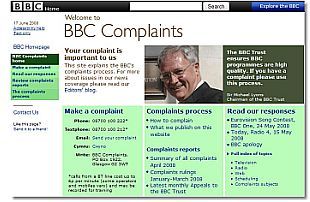 According to the BBC Complaints website, the process for making a formal complaint is “designed to be straightforward to use and to enable us to address your concerns properly.”
According to the BBC Complaints website, the process for making a formal complaint is “designed to be straightforward to use and to enable us to address your concerns properly.”
Yet, every time we put out a call to action, we would receive e-mails from confused readers who couldn’t figure out how to make their complaint.
So in 2008, we posted an Idiot’s Guide to Navigating BBC Complaints on Backspin, our daily blog. It’s one of the most-viewed entries in the blog’s six and a half year history. No other news service makes complaints so complex.
And having made your complaint, you may be satisfied to receive a response within 10 working days as the BBC aims for. From our experience, however, most complainants are certainly not happy with the excuses meted out by BBC employees desperate to avoid taking responsibility for biased coverage that sometimes even breaches the BBC’s own guidelines on impartiality.
Having got this far, do you take it further? According to BBC Complaints:
If you made your original complaint through this website, you will need to use our webform again to explain why and to request a further response. You should normally do this within 20 working days. If you consider the second response still does not address your complaint, we will advise you how to take the matter to the next stage.
By this time all but the most dedicated or patient activists have given up, which is most probably what the BBC hopes will happen, thus avoiding any further inconvenience on their part.
 Contributing to the CiF Watch site, one blogger describes his experience when mounting a complaints procedure surrounding Guardian political editor Michael White’s disgraceful comments on a BBC radio programme as first revealed by HonestReporting:
Contributing to the CiF Watch site, one blogger describes his experience when mounting a complaints procedure surrounding Guardian political editor Michael White’s disgraceful comments on a BBC radio programme as first revealed by HonestReporting:
The saga has come to an end. I received two pages of very underwhelming guff from Andrew Bell, the Complaints Director of the BBC’s Editorial Complaints Unit.
Embedded in it, at the beginning of the penultimate paragraph, was the information that he had not been able to uphold my complaint. There were clues earlier on, of course, notably where he told me that he had researched into targeted killings by Israel, which seemed to me to be over and above the call of duty, but no matter. The letter informs me that I can if I wish take the complaint further still, but I get the distinct sense that that would be rather like shouting down a well.
The CiF Watch blogger concludes:
For myself, I care very little about White’s opinions about anything. He is a Guardian political editor and little more need be said in the light of that. I do care, however, that presenters of a radio programme showed partiality and bias in their agreement with White’s distinctly questionable anti-Israel views and his choice of where and how to air them, and have been allowed to get away with it.
I am also very concerned that the BBC, which I fund from my licence fee, can promulgate such drivel from Andrew Bell under the guise of an investigation into a complaint. (In this it operates very much like CiF, which believes it can have the reader believing at least six impossible things before breakfast if it spins them correctly). The letter was verbose and unclear from the beginning and, as I have said, I realised that my complaint had not been upheld only at the end of the penultimate paragraph. In this it was rather like the tale told by an idiot, but one which completely lacked sound and fury and signified absolutely nothing and I began thinking, after the second reading of it, that Bell’s intention was to bore me into a stupor.
I am not surprised, of course. This is, after all, the BBC.
Read the full blog entry here and check out CiF Watch for continuous coverage of the obsessive anti-Israel articles and comments that appear on The Guardian’s Comment is Free site.
Bob Bashes the Beeb
 The BBC consistently appears on HonestReporting’s radar for producing biased or inaccurate reports on Israel. But is the problem in the BBC newsroom limited to its Israel coverage? Bob Geldof, the man behind the Band Aid charity appeal for Ethiopian famine victims in the 1980s thinks not. Following a BBC World Service report claiming that charity funds were diverted for weapons sales, Geldof launched a scathing attack on the BBC:
The BBC consistently appears on HonestReporting’s radar for producing biased or inaccurate reports on Israel. But is the problem in the BBC newsroom limited to its Israel coverage? Bob Geldof, the man behind the Band Aid charity appeal for Ethiopian famine victims in the 1980s thinks not. Following a BBC World Service report claiming that charity funds were diverted for weapons sales, Geldof launched a scathing attack on the BBC:
Rageh Omaar’s piece “Even Band Aid is not above criticism” is ridiculous. It is of course not about me, or Band Aid, but rather a defence of journalistic exceptionalism, and the now thoroughly discredited BBC World Service programme that “sexed up” a claim that nigh-on the entire humanitarian relief effort by all aid agencies was diverted to arms in Tigray province in 1985. …
And how arrogant you are, how self-important, that you should deign to lecture on the implied assumption that you, and by extension all journalists – and specifically in this case the BBC World Service – are above the criticism that you are so busily wagging your finger at me for, and which I (clearly getting above my station) have last weekend meted out to your incompetent mate and his associates at the Beeb. Get it straight, pal – you are not. Either as individuals or organisations. It’s about time a little humility was allowed into your closed self-regarding little media world. But like the bankers and the MPs these days, you lot just don’t get it, do you? …
Just as the Ross-Brand affair exposed the systemic weaknesses of the BBC in the area of entertainment, so this now does in the news sector of the World Service – albeit with far more drastic consequences. Where were the editors, subs and producers? As the Independent rightly asked, “Did the bells not go off” early on in this sorry tale? Where were the checks, balances, neutrality, even-handedness? They all failed at the World Service. Worse, they inconsistently and continuously contradicted themselves in their ludicrously pompous Rorke’s Drift-type face-saving insistence on “sticking by their story”. Well, they were right in the use of the word “story”.
Doesn’t it all sound too familiar?
Read Bob Geldof’s full commentary here.
Your Complaints Still Count
 Having read the above, you may be asking why should you even bother to make a complaint to the BBC as we often urge you to do. Perhaps the most obvious answer is that of accountability. While we may not always agree with the BBC’s responses, the corporation, as a public service broadcaster, is obliged to follow up on complaints and all such complaints are logged. There is no better way to make the BBC aware of your concerns.
Having read the above, you may be asking why should you even bother to make a complaint to the BBC as we often urge you to do. Perhaps the most obvious answer is that of accountability. While we may not always agree with the BBC’s responses, the corporation, as a public service broadcaster, is obliged to follow up on complaints and all such complaints are logged. There is no better way to make the BBC aware of your concerns.
In addition, BBC News staff are made fully aware when their reports generate a large number of complaints. And don’t just take our word for it. While it may have been a shocking piece of journalism full of innuendo, Channel 4’s Dispatches documentary on “The Israel Lobby” interviewed a former BBC employee who claimed that BBC newsroom staff were ‘intimidated’ by the level of complaints generated by organisations such as HonestReporting.
While we do not believe that genuine e-mail complaints from concerned members of the public are intimidatory in any way, we are pleased that our efforts are noticed by the BBC and taken seriously. Please continue to write to the BBC with your concerns and feel free to notify us of any responses you receive.
Dear George…
 It’s not only Channel 4 that seems to think that sending letters to the editor or complaints to the BBC is an illegitimate form of protest. After George Galloway used his column in Scotland’s Daily Record to recycle the organ harvesting blood libel, HonestReporting quite rightly called for him to be held to account. In a February column, it seems that Galloway didn’t take too kindly to the complaints:
It’s not only Channel 4 that seems to think that sending letters to the editor or complaints to the BBC is an illegitimate form of protest. After George Galloway used his column in Scotland’s Daily Record to recycle the organ harvesting blood libel, HonestReporting quite rightly called for him to be held to account. In a February column, it seems that Galloway didn’t take too kindly to the complaints:
There can be no more crawling to the Israel lobby who mobilise thousands of sycophants to complain every time people like me write or broadcast items like this, hoping to intimidate editors and proprietors into putting a lid on criticism of Israel.
It usually works. It frightened the BBC into the scandal of the Disasters Emergency Committee appeal that never was during the recent Gaza War and it has circumscribed my work on both Talksport and even Press TV during the last year. The Record’s editor is still busy, months after an article I wrote here, dealing with complaints from “outraged Record readers”..in, er, Israel.
But perhaps we should simply take Galloway’s bluster with a pinch of salt. After all, as the Jewish Chronicle reports, Galloway’s Viva Palestina group has been criticised for “misleading” the public after it announced it had raised £1m for Gaza, when the real figure was just £180,000.
Could George be a little prone to over-exaggeration?

